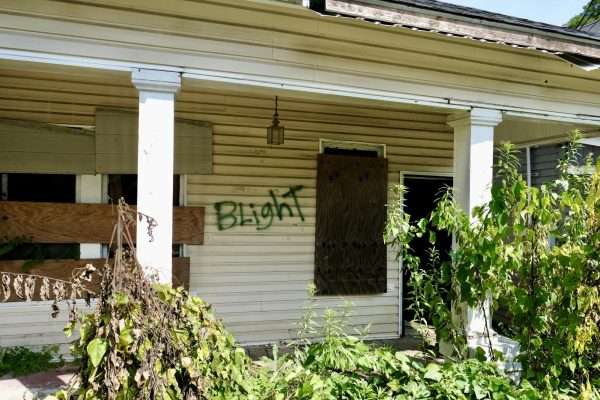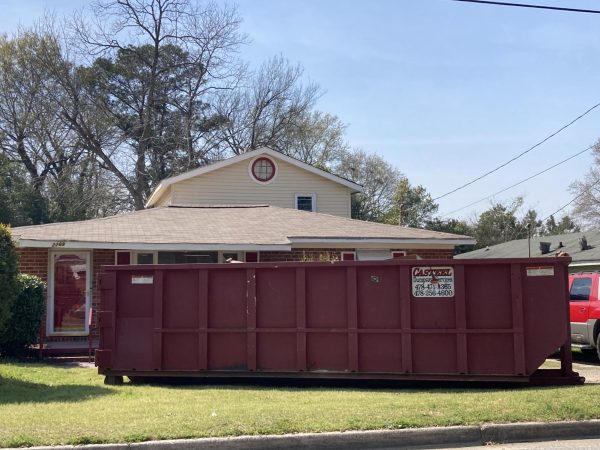Have real estate agents contributed to Bibb school segregation?
Seth Clark and his family recently moved back to Macon from Atlanta . They bought a house in the Vineville neighborhood even though he said the selling agents emphasized crime and problems with the public schools in the area.
When Lisa Mayfield was moving to Macon 20 years ago, she told her real estate agent she was going to send her children to public school, but her agent advised against it.
“We were strong supporters of the public school system, and she said, ‘Well if that’s the case, then you want to be in this part of town,’” Mayfield said. “She would only show us homes in the Sonny Carter and Springdale districts.”
Mayfield is white, and the student bodies of Springdale and Sonny Carter were both about three-quarters white at the time. Her family ended up purchasing a home in the Sonny Carter zone, and she was happy with her children’s education. However, she said the experience with her real estate agent was peculiar.
“I found that interesting, that a real estate agent, who is an ambassador for the city, had that opinion,” she said.
Mayfield’s experience could be an example of “racial steering,” a term used to describe a practice by real estate agents to guide potential buyers to certain geographical areas based on race.
The practice was outlawed by the Fair Housing Act of 1968, and is also addressed in the National Association of Realtors’ Code of Ethics, which says real estate agents should not discriminate on the basis of race. However, the National Fair Housing Alliance conducted a study published in 2008 in which the organization sent undercover buyers to ask real estate agents about homes on the market, and 87 percent of those agents allegedly engaged in some form of racial steering.
Parents today generally come to real estate agents with decisions about education and neighborhoods already made, said Joe Adams, an agent at Sheridan Solomon & Associates Realtors. (Emails and phone calls to two dozen other real estate agents and real estate firms in Middle Georgia inviting comment for this article went unanswered.)
“The buyers really come to us already very, very knowledgeable about the market and what schools they may want to be looking for or houses within a specific school district,” Adams said.
He said some parents of higher socioeconomic status have already made the decision to send their children to private school.
“The question isn’t where does your child go to school, but which private school does your child go to. That’s what they’re asking,” Adams said.
Mayfield said she’d like to know how many parents who have sent their children to private schools have actually walked in the schools they are zoned for.
“I think that so much good stuff is happening in the public schools, and we get a little bit of that in the news, but not enough,” Mayfield said. “Overall, people are just kind of closed minded.”
Mayfield said she sent her children to public school because she did not want to raise them in a bubble.
“That doesn’t make me a bad mother for sending my child to a public school,” Mayfield said. “In fact, I think it makes me a better mother because I’m putting my kids in a position to where they’re better prepared for life.”
Mayfield’s eldest daughter, Christina, who is doctoral student in psychology at Mercer University, said she is thankful to Bibb County schools for the education she received.
“Going into a profession, such as psychology, you need to be able to work with all different types of people, and I really think my experiences in the Bibb County school system kind of set me up for that,” Christina said.
Mayfield said she relied somewhat on her real estate agent’s opinion on which schools she should send her children to because she was new to the area, but she still visited the recommended schools before her final decision.
“We liked what we saw at Sonny Carter, and we didn’t like what we saw because it was 75 percent white,” she said. “It was a good, well-run school.”
Mayfield said over the years she saw the shift in the racial makeup of Sonny Carter, which today is about a third white. If she had to choose a school for her children today, she said, the new racial make-up would not have changed her opinion because it is still a good school.
Although Adams said he doesn’t believe real estate agents are steering people to certain neighborhoods based on school zones, he said agents do tell people to avoid the downtown area.
“Realtors are pretty notorious about telling people don’t live downtown, which is where I live,” Adams said. “It’s just a perception, a false perception, about crime.”
Although Mayfield’s experience happened 20 years ago, Seth Clark said he had a similar experience recently with seller agents.
“It was kind of a recurring theme that the housing or that the schools hadn’t caught up with downtown yet,” Clark said. “We experienced that at least on three different occasions from three different selling agents down here.”
Clark, a Macon native, moved back to Macon from Atlanta with his wife and young son, and they began looking for houses in January 2016. They purchased a house in the Vineville neighborhood in the Rosa Taylor Elementary School zone, where children of color are about 80 percent of the students.
Clark, who is white, said his family wanted to move to either the Vineville or downtown area near the Pleasant Hill neighborhood because they go to church in Pleasant Hill, but the selling agents emphasized crime and problems with the public schools in that area.
“We were a little taken aback when (Pleasant Hill, a historically black neighborhood) was kind of the central point of diverting people away from the neighborhood,” Clark said.
He said the agents never told them not to move to the downtown area, but they talked about issues with the public school system and crime in the area similar to the way they talked about problems with a home’s walls or flooring.
Clark said he was thankful he and his family had an understanding of Macon and of the school zones when looking for houses.
“We’re a new family. You know, if we were moving to Albany or Savannah or something, we would’ve absolutely listened to those selling agents,” Clark said.
Mayfield said her agent’s reaction speaks to the reputation of Bibb County public schools.
“I mean the fact that my real estate agent 20 years ago told me that I didn’t want to send my child to public school is some indication of her opinion, whether correct or not,” Mayfield said.
Although Clark said property values are generally higher and real estate agents will make more money from selling houses in wealthier, whiter areas, he said he does not believe their actions have completely ill intentions.
“I don’t think they would, these selling agents, would explicitly say that they’re selling white people white houses in white neighborhoods and saying to avoid black neighborhoods,” Clark said. “I think they see it as … actually serving the person who’s buying the house.”
Adams said 20 years ago, real estate agents could sell houses to people based on race because they knew where neighborhoods with predominantly black or white people were. Things have changed, he said, with many black families buying into historically white neighborhoods in recent years, though, he added, black neighborhoods seem to be becoming “more and more predominantly black.”
“What’s happening is that black people are buying in more predominantly white neighborhoods, and less of the other is happening,” Adams said. “That probably has something to do with why the schools are becoming more segregated.”












